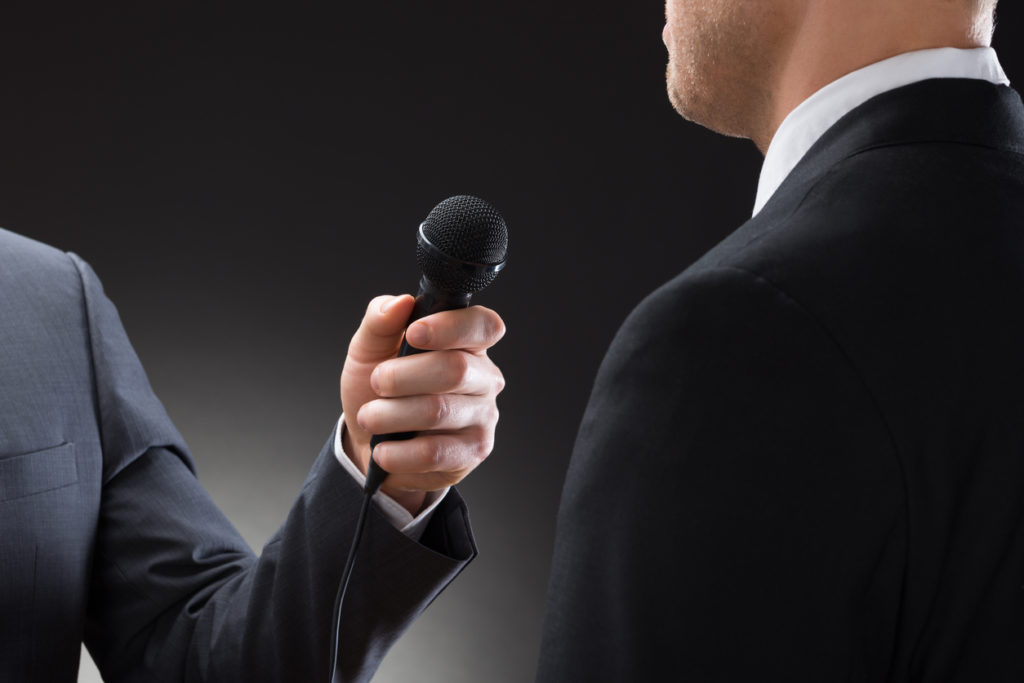The Worst Advice Media Trainers Offer Clients
A surprising number of our clients share with me a piece of advice they learned from a media trainer somewhere along the line: “Don’t answer the question the reporter asks you. Answer the question you want to answer.”
I’ve met several of my industry peers—and have read articles, blogs, and books from some of those I haven’t—and I’ve yet to encounter a professional media trainer who offers that advice to their clients. So I really don’t know where that bad advice is coming from.
What I do know is that it’s pervasive. Many clients, who work all over the country and have never met one another, have heard that bit of hackery somewhere along the line. And if they take that advice into their interviews, they’re going to create a disaster for themselves.

Perhaps that advice comes from an earlier era, one in which reporters were less likely to air the full raw tape of a spokesperson dodging a question. To the degree that era ever existed, it’s over. Journalists regularly (and rightfully, in my view) shame spokespersons who refuse to answer direct questions by exposing their evasions.
As an example, check out this video of British Labour Party Leader Ed Miliband, who pretends that the journalist is invisible.
Naturally, there may be times when you don’t want to answer a question. Perhaps the reporter is asking you about something off-topic instead of the thing you really want to be speaking about. Maybe a journalist wants to know an embarrassing detail you’d rather not reveal, or about a confidential detail your lawyers have banned you from elaborating upon. (Read more about “Commenting without Commenting” here.)
Even in those moments, it’s almost always better to answer the question directly—and briefly—before transitioning to something else. In some situations, you may even be able to answer the reporter’s query with incomplete sentences and responses in which you don’t cite the subject by name to make your answer more difficult to quote. But answer the question.
Here’s an example:
Let’s say a reporter is asking you about a campaign staffer who was arrested for DUI. You’ve decided not to fire that employee, and you already answered questions directly about his arrest yesterday; every major newspaper, website, and news channel covered the story extensively today. You’re reluctant to continue speaking about it, as your detailed responses will only lead to additional news stories that will take you far off your campaign’s message.
Reporter: “A lot of people in the media are asking why you didn’t fire Bob Smith yesterday? You’ve been speaking about the need for personal responsibility throughout this campaign, and your refusal to fire him seems to contradict your message.”
You: “You know, I addressed that question and several others on this topic yesterday. My answers haven’t changed, and there’s nothing new to add. Many members of the press have already spent a full day covering that story in detail. Given that we only have three weeks left in this campaign, I’m going to spend today speaking about the important issues voters consistently tell us they care about most.”
That answer doesn’t share any new information. It doesn’t give reporters any juicy quotes to add to their news story. But it does address the specific question that was asked.
So ignore that pervasive but pernicious piece of advice. A direct question deserves a direct answer—even if it’s not the direct answer the reporter hopes to hear.
Learn more about the best ways to answer media questions in The Media Training Bible: 101 Things You Absolutely, Positively Need to Know Before Your Next Interview.



Great post, as always. I’ve too heard this poor advice, and I’ll tell you where – on TV, countless times, usually before a debate. It’s always spoken with great authority by one pundit, with heads nodding in agreement around the table.
So, ironically, I think the real culprit is the media themselves . . . not journalists, per se, but the “talking heads” brought in to inform and entertain the public.
As for the clip, the funny thing is the questions are not all that probing or accusatory; more in the “I just want to hear more of what’s going on behind the scenes” vein than anything else.
What rubbed me wrong was the insistence Millibrand had in parroting the exact same language each time. It was displeasing to the ear. Had he simply given a nod to the question and varied his wording, he would have been much more effective.
Depends on the story and the setting. Sometimes in live interviews the questions are so inane that one has no choice but to redirect the conversation. Sometimes the artful dodge includes ignoring the story.
Great article and so true. It’s always difficult to work with a client who has received erroneous information from a trainer — or worse yet, been made to feel insigmificant or stupid during a coaching session.
Joyce,
Thank you for your comment. You’re exactly right about the challenges of working with a client who’s been given such disastrous advice in the past – instead of merely training them, you have to first “untrain” them. I often say that my greatest competition isn’t good media trainers, but bad ones who make people cynical of the entire industry.
Thanks for commenting!
Brad
Hi Brad – great post. That advice is so 1970’s! I wince every time I hear that, and sadly I do all too often. Sadly too many people working in our profession do not understand the new rules of the media game and the need for authenticity above all.
Also reminds me of the time that one my clients revealed that he had been trained to answer every question with “that’s a great question”! OMG – how bad is that? Had to work hard to convince him that response only works when you are genuinely mean it and probably only one in an interview.
I love how you contribute to our profession Brad. Thank you.
Hi Jane,
That’s an awfully nice compliment – thanks very much. Yes, that advice is outdated — but there appear to be others who are teaching it. If they read this blog, I hope they stop, stat!
I’m with you on the “That’s a great question” thing, too. If it happens a time or two, it’s not likely to doom an interview. But it’s unnecessary – and I’d rather have the spokesperson pause for half a beat instead of using verbal time killers.
Thanks for commenting,
Brad